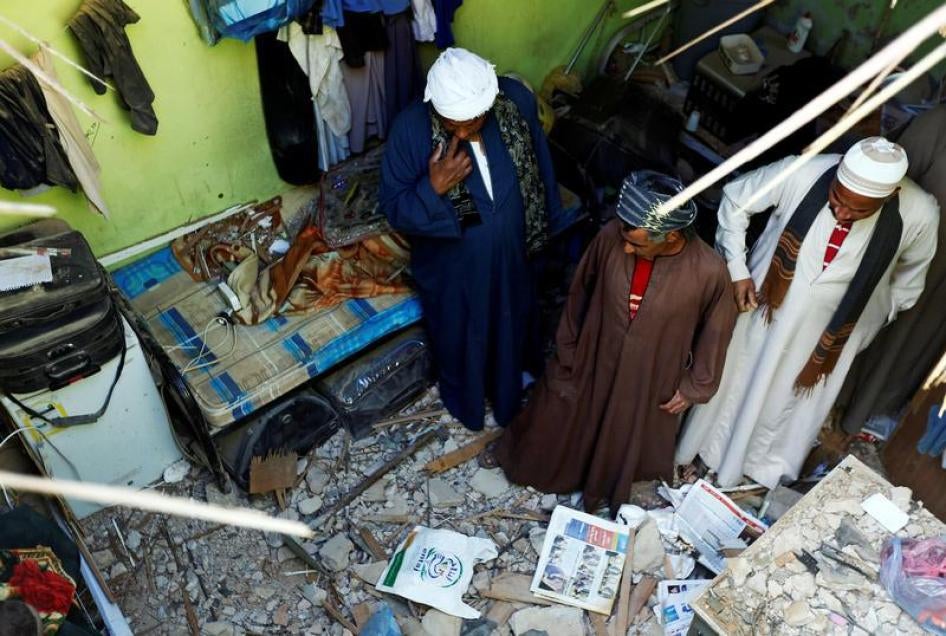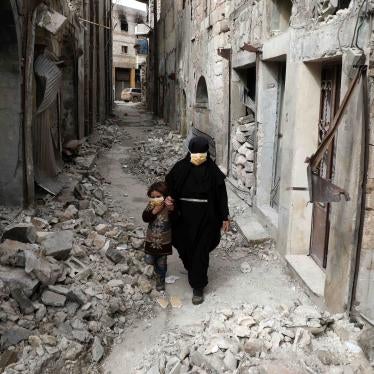(Beirut) – Houthi forces in Yemen violated the laws of war by launching ballistic missiles indiscriminately at populated areas in Saudi Arabia on March 25, 2018, Human Rights Watch said today. The attacks killed an Egyptian migrant worker and injured two others in the capital, Riyadh, the official Saudi Press Agency reported.
During the three-year armed conflict between the Saudi-led coalition and the Houthis, Houthi forces have fired artillery into populated cities in Yemen and launched missiles toward populated areas in Saudi Arabia. In November, the coalition blocked all Yemeni land, air, and sea ports in response to a Houthi ballistic missile attack on Riyadh’s international airport. The coalition eased some restrictions in late 2017 but has continued to impede aid and commercial imports from reaching Houthi-controlled ports and has kept Yemen’s main airport closed since August 2016, worsening the country’s humanitarian catastrophe.
“The Houthis should immediately stop their indiscriminate missile attacks on populated areas of Saudi Arabia,” said Sarah Leah Whitson, Middle East director at Human Rights Watch. “But just as unlawful coalition airstrikes don’t justify the Houthi’s indiscriminate attacks, the Saudis can’t use Houthi rockets to justify impeding life-saving goods for Yemen’s civilian population.”
Yemen is experiencing the world’s largest humanitarian crisis, according the UN, with more than eight million people on the brink of famine and more than one million suspected to be infected with cholera.
The Saudi Press Agency reported on March 26 that Houthi forces launched seven ballistic missiles into Saudi Arabia from Yemen, which Saudi air defenses “intercepted.” Houthi-aligned media confirmed the attacks, announcing that the Houthis had targeted Riyadh’s King Khalid International Airport with a Burkan 2H rocket, the Abha Regional Airport in southern Saudi Arabia with a Qaher 2M rocket, and multiple targets across the southern provinces of Jazan and Najran with Badr 1 ballistic missiles.
King Khalid Airport is about 35 kilometers northeast of the densely populated areas of Riyadh. The airport is civilian, although it includes a company that services and maintains military aircraft. While the site where Houthi forces launched the rocket is unclear, the airport is 850 kilometers from the Yemeni border, well beyond the range at which the Burkan 2H missile can accurately target military objectives. Abha Regional Airport is a civilian airport 110 kilometers from the border and 15 kilometers west of King Khalid Air Base, one of Saudi Arabia’s largest military airbases.
Attacks with unguided ballistic missiles such as the Burkan H2 or Qaher 2M are often indiscriminate, particularly at long ranges, where they cannot accurately target military objectives. When deliberately or indiscriminately directed toward populated areas or civilian objects, such attacks violate the laws of war. Those ordering such attacks may be responsible for war crimes.
When used in densely populated areas, ballistic missiles with large payloads of high-explosives have a wide-area destructive effect that cannot distinguish adequately between civilians and military objectives, almost invariably resulting in civilian casualties. Military commanders, as a matter of policy, should not use ballistic missiles with wide-area effects in populated areas, Human Rights Watch said.
At a news conference on March 26, the Saudi-led coalition spokesman, Col. Turki al-Maliki, announced that the “scattering splinters of the missiles” landed in various neighborhoods of Riyadh, killing and wounding the migrant workers. He also accused Iran of exporting the missiles to the Houthis in Yemen. On the same day, an official with Iran’s Islamic Revolutionary Guards Corps denied that Iran had sent any ballistic missiles to Yemen, saying that “Yemenis have reached the capability to produce their own defensive weapons including missiles; an achievement that has been inconceivable to Saudis.”
In January 2018, the United Nations Panel of Experts on Yemen stated that it had “identified strong indicators of the supply of arms-related material manufactured in, or emanating from, the Islamic Republic of Iran subsequent to the establishment of the targeted arms embargo on 14 April 2015, particularly in the area of short-range ballistic missile technology.”
The Saudi-led coalition spokesperson stated on March 26 that Houthi forces had fired 104 ballistic missiles into Saudi Arabia since the beginning of the conflict, a number Human Rights Watch is unable to confirm. On November 4, Houthi forces fired a ballistic missile at Riyadh’s international airport, with some missile fragments falling inside the airport area. Human Rights Watch has documented Houthi forces’ indiscriminate launching of short-range unguided artillery rockets from northern Yemen into populated areas of southern Saudi Arabia since May 2015. Some of these attacks killed and injured civilians.
The Houthis have frequently, indiscriminately shelled densely populated areas in Yemen in violation of the laws of war, killing and wounding civilians. These attacks have had a particularly heavy toll on Yemen’s third largest city, Taizz, Human Rights Watch said.
After the November 4 Houthi missile attack on Riyadh’s airport, the coalition announced it would close all sea, land, and air ports to Yemen temporarily, saying that aid would continue with strict vetting.
The November closure compounded the dire humanitarian situation of Yemeni civilians, which had already been exacerbated by the restrictions on imports that the Saudi-led coalition had been enforcing before the November closure, Human Rights Watch said. Houthi forces have also violated international legal obligations to facilitate humanitarian aid to civilians.
The coalition eased some of these restrictions in late 2017 and announced a major humanitarian aid package and plan that the coalition claimed would ensure Yemen’s import needs were met.
However, the coalition has previously broken its promises to abide by international law when imposing a blockade, Human Rights Watch said. It has delayed and diverted fuel tankers, closed a critical port, and stopped life-saving goods from reaching the population.
In February, commercial imports to Houthi-controlled ports “reached their all-time low,” according to the UN, with food imports half and fuel imports less than a quarter of the country’s monthly requirement. No “containerized cargo,” which can include general goods, timber, and mixed humanitarian and commercial cargo, has reached Houthi-controlled ports following the November closure. The coalition has also closed Yemen’s main airport at Sanaa for more than a year, blocked rights groups from entering areas under Houthi control, and repeatedly interfered with UN flights carrying aid workers into Yemen.
On March 15, the UN Security Council called for the “full and sustained opening of all Yemen’s ports” to all commercial and humanitarian imports, increased access to Sanaa airport for lifesaving aid and urgent humanitarian cases, and for UN flights to “proceed unhindered.”
In March, the UN human rights office reported that civilian casualties had “dramatically increased during the past six months,” and that, over the previous three years, the UN had verified that 6,100 civilians had been killed – including 1,491 children – and 9,683 wounded. Coalition airstrikes caused 61 percent of the recorded civilian casualties, and indiscriminate Houthi shelling and sniper fire in densely populated areas “accounting for much of the remainder.”
“Three years into the coalition’s war in Yemen, the situation for civilians is as grim as ever,” Whitson said.








